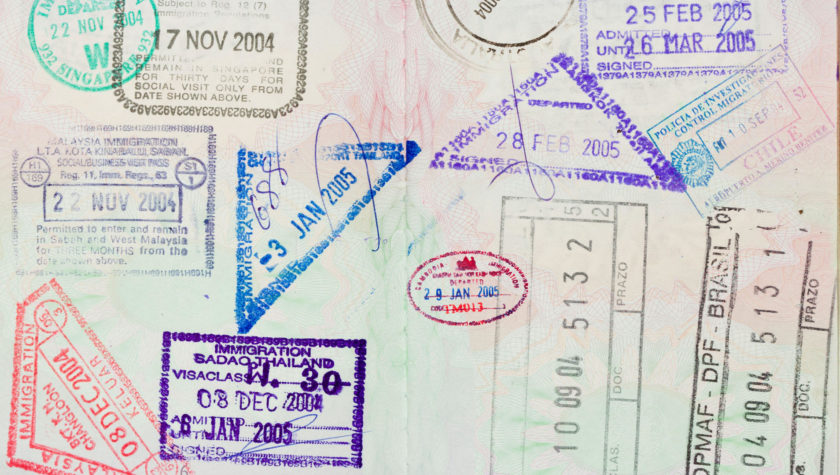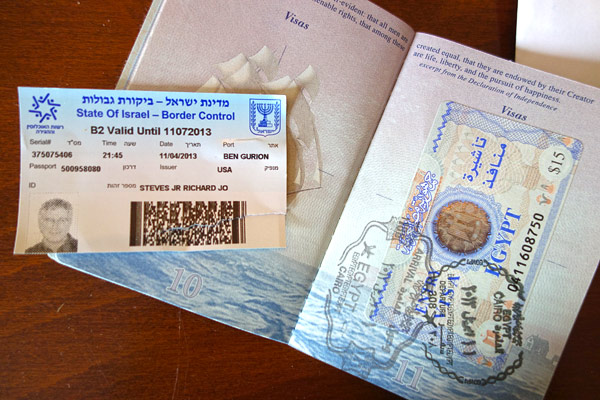
Before booking a trip to Palestine, many people wonder if the Israeli visa will allow them to enter the West Bank. The answer is yes, in order to enter the West Bank, you will need an Israeli visa. Palestine is only partially recognized as a state by the international community, and it does not have control over its own borders. The West Bank borders are controlled by the State of Israel; therefore, a “Palestinian visa” does not exist.
The only way to enter the West Bank is via Israel, Jordan, or Egypt, and each of these options requires dealing with Israeli border control officials to secure an Israeli visa.
- Most visitors to the West Bank choose to fly into Ben Gurion Airport near Tel-Aviv, Israel.
- Upon arrival at the airport, visitors from the majority of western countries are issued a free on-arrival B/2 tourist visa.
- These visas are usually valid for 90 days, but the duration can be shortened at the discretion of the Israeli authorities.
- Be sure to check your country’s visa requirements for Israel before traveling; however, over 99 different jurisdictions do not require a visa in advance for tourism purposes.
- If you are a citizen of the United States, Canada, the European Union, Australia, Russia, and the large majority of Latin America, you will be eligible for a visa on arrival.
If you hope to stay for a longer period of time in the West Bank, it is possible to apply for a visa extension through the Israeli government or do a ‘visa run’ to Jordan or Egypt. A visa run is a short trip over an international border with the intention of resetting a visa that is about to expire.
In most cases, taking a sightseeing trip to Jordan or Egypt for the weekend and then returning to Israel will provide you with a new three-month B/2 tourist visa. Applying for a visa through the government is often a much longer and more drawn-out process, with a high possibility of being rejected; thus, most people opt for the visa run option.
However, be wary of how many times you extend your visa via a visa run. Using this option more than one time will likely lead to suspicions from Israeli border officials and could lead to you being rejected or banned from entry into Israel.
The Israeli “Passport Stamp”
Israel no longer stamps tourists’ passports due to issues that an Israeli stamp can provide for people hoping to travel throughout the region. These issues stem from the Arab League boycott of Israel, in which several countries have restricted entry to people with Israeli passport stamps. It is necessary to note that Israeli officials do reserve the right to stamp your passport if they wish to do so, but this is not common.
In lieu of a passport stamp, you will be given a small loose-leaf visa entry card to serve as proof of lawful entry. Do not lose this! It is your only proof that you have entered the country legally, and it is not uncommon for Israeli Defense Force soldiers and security to ask to see your visa at checkpoints throughout the West Bank. Many people choose to take a photograph of this visa that they can use as backup proof of legal entry in the absolute worst-case scenario.
Dealing with Border Control Officials
It is recommended that independent travelers be honest about their travel plans to Israeli border officials. Though Israel does make an effort to keep foreign activists out of the West Bank, travel to the West Bank is legal and frequent. Lying to officials can lead to deportation or refusal of entry. Your entry into Israel is entirely at the discretion of the border officials.
When traveling to-and-from the West Bank, expect a longer security check that will last from 1-3 hours, especially if you have traveled to other countries in the region. Most of the time, this extensive questioning will only occur when entering Israel for the first time and when leaving Israel after an extended period of time spent in the West Bank. Remain calm, respectful, and honest, and you should have little issue securing a visa and be on your way to the West Bank in no time!



